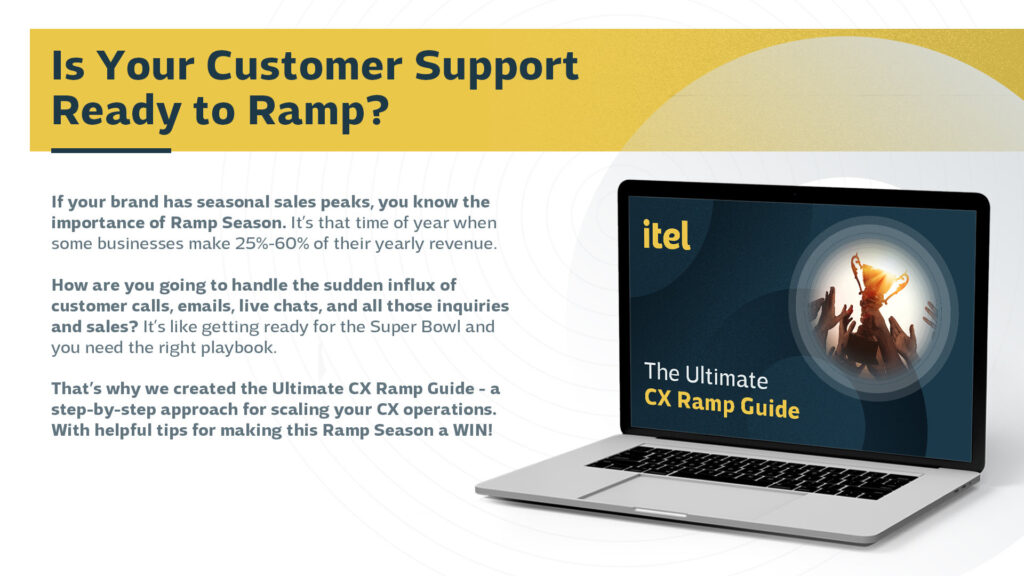What Has Changed in Customer Service?


An Interview with Shep Hyken
Customer Experience Expert, Speaker and Author
For Customer Service Week, we sit down with New York Times bestselling author and renown customer service and customer experience (CX) expert, Shep Hyken, to discuss all things CX, including what has changed in customer service, and the shifting landscape of customer expectations.
Welcome Shep. Nice to meet you.
Thank you. It’s nice to be here.
Obviously, customer service is particularly important to us as a company and especially as a CX provider. It’s our business and our passion. And you’ve been speaking and writing about customer service for over 30 years. In fact, I’m sure you get asked this a lot, but for you, why is customer service so important?
A lot of people misunderstand the concept of customer service. It’s not just a department that directly connects to outside customers but is really a philosophy to be embraced by every employee of the company. Some people never deal with an outside customer, but they're still very integral to the customer experience. And if your business is truly customer focused, then what you really have is a customer service culture. It’s the backbone of your organization.
You have studied customer service quite extensively and have interviewed dozens of experts, researchers, and industry leaders. What are some of the major shifts you've seen over the years?
Well, number one, if you go back at least 10 to 12 years, customer experience was a term that wasn't widely used. It was more of a fancy term for customer service. Over time, people started to recognize that customer service was just part of it and marketing started to become very closely aligned with service and experience. That’s when predictions started to come out that customer service and customer experience would become the most important investment that companies can make. I think that’s one of the major shifts - how central CX has become for many businesses. It’s become the main competitive differentiator.
Have customer expectations changed as well?
Yes, and I've been saying this for several years. Customer expectations have become higher and higher. Because, in the past, people were happy if you were just friendly and could answer their questions in a reasonable amount of time. Whereas, today, with companies like Amazon and Lexus delivering the best service, customers are no longer comparing your business to direct competitors, they’re comparing you to every other company they meet. So, their expectations are now, “you better be friendly, and you better get my answers to me very fast”.
The pandemic also caused a major shift in the way people consume and shop and how they relate to brands. What changes did you notice post-pandemic?
Pre pandemic, I started to look at what was making certain companies excel over their competitors. It tended to come down to convenience, a frictionless experience.
Then, the pandemic rolls around, and suddenly, service delivery becomes crucial. Companies started looking for new ways to serve their customers. I have a case study about a car dealership that eliminated the need to even visit a waiting room or showroom during the pandemic. If you wanted to test drive a car, you would make an appointment and the salesperson would drive over so you could test the car, then you could look at a computer and choose all the options you want without ever having to go to the dealership. If you need your car serviced, they will send someone over with a courtesy car, pick your car up, and then return it to you once they’re done. And after the pandemic, when every other car dealership or manufacturer went back to in-person appointments, they kept the same service delivery model. That differentiated them from every other car dealership that didn’t offer that exceptional customer experience. So, you can see how the pandemic accelerated our expectations of what customer service is all about.
It sped things up, and people were able to see what customer service could look like and didn’t necessarily want to go back to business as usual once the pandemic was over.
Right.
So, on that topic, how do you stand out in terms of CX nowadays?
Well, I have my six basic principles of customer service. Remove friction; use technology; create self-service options when it's appropriate; add a subscription model, which is really important today; service or product delivery, is it easy and convenient; and the last one is access, how accessible are you, which is tied into hours, logistical access, location etc. The main difference today is that it’s easy to get customers to like a brand. I can put out valuable information, or talk about my company’s philanthropy or sustainability, but trust is another matter. Trust means that when I do business with you, I know you won’t let me down. It's consistency and predictability. It’s delivering on your brand promise. That’s what makes you stand out.
Trust is very crucial to loyalty. The average customer may tolerate a poor experience twice, maybe three times, and then they're gone.
It really depends on the industry. In my research, the average Boomer will give you 2.6 chances and Gen Z is a little less jaded, so they will give you maybe 3.1 chances before they abandon your brand for someone who delivers a better customer experience.
Surely, though, you can’t please everyone.
You can't please everybody, but it’s important to understand who your audience is, who’s your customer? When you understand who they are, you can appeal to their desires. For instance, one of my recent findings is that 71% of customers, when surveyed, still prefer the phone as the number one choice for reaching out to a company.
That’s interesting. I didn't expect the phone to be as popular as say live chat or email.
There’s another interesting thing. We looked at different studies in the UK and the U.S., and they were showing a 30% increase in people calling support versus going online or using a digital option.
Yes, I think the pandemic left a lot of people feeling really isolated and disconnected. We kind of crave that human connection again.
Surprisingly, even social media didn’t rank as high as we thought when it came to preferred customer service channels. What I came to learn is that, to customers, social media is really the least desirable way to communicate. People often choose to go on Twitter or Facebook because they have had no success getting their problem solved through other channels. Maybe they send an email, and the company never responds, or they call customer support, but get tossed around from agent to agent, without getting the answers or help they need. Social media isn't the first choice. It's often a last resort.
Is that why consistency in customer service is even more important than wowing customers every time?
Well, most people have a different definition of a WOW experience, and yes, you cannot do that every single time. It's impossible. You get to do it when things fall in your lap. If I'm a server at a restaurant, and I overhear this couple talking about their anniversary, I can surprise them with a little cake and a candle and yes, deliver that WOW experience. But the next time they come in, it's not their anniversary. So, how do I deliver that WOW? But say, when I contact a company, they’re always friendly, always helpful, always get back to me quickly, and always take care of me when I have a problem, that's what I, as a customer, will look for. Creating an amazing experience is not about Wow, it's about consistency and predictability and giving the customer what they expect and what they want.
Yet, clearly, customers aren’t quite getting what they want from every brand. In your recent 2022 ACA study, you mentioned that 84% of customers say that companies aren’t quite doing enough and should focus extra efforts on CX. Why are some companies still not delivering the kind of experiences that customers want?
People ask me this all the time. How do I get my leadership team to invest more in CX or in new technologies that could help make the service experience better? It often comes down to dollars, the concern about what it will cost, so I always love to start with numbers. Let's say it costs me a million dollars a year to invest in CX. However, that allows me to charge 2% more, which means I'm still competitive, but that 2% equates to 5 million or 10 million in extra revenue each year. And when we surveyed customers, 58% would be willing to pay more if they knew they would receive great customer service. So, doesn't it make sense to invest a million to make my price less relevant? Plus, you then eliminate some churn and gain more loyalty.
What was also startling in your report was that 59% of customers think customer service is worse now than before the pandemic. Is that because many companies were short on staff or had to cut or reduce in-store services?
The problem is, in economic downturns, or say during difficult market conditions like we saw during the pandemic, you start to look for ways to cut and often the ways you cut are easily spotted by customers.
An example that comes to mind is an article I wrote about a restaurant that was just coming out of the pandemic, and they were experiencing serious staff shortages because they just couldn’t find enough people. Rather than struggling to serve a full restaurant, the owner made the conscious decision to basically shut off half the space, using only 50% of its seating capacity, to maintain the quality of its experience. His rationale was, sure, I could pack this place with customers, but then, I wouldn’t have the staff to serve you, and you would be waiting an hour for your food. I thought that was an incredibly good thing because they worked so hard to build their reputation. So, they found a way to make it work in a way that didn't erode the customer experience. Because the problem with cutting your CX in times of crisis is that your competitor may not, and you might lose out.
It's also about treating your customer service team well, taking care of those at the frontline of your business.
That’s what most people don't realize. Your employees directly represent your brand, and in your case, as a BPO (Business Process Outsourcer), your agents represent other companies. They act as brand ambassadors, and I call it an awesome responsibility, because at that point of customer contact, in that moment when a customer calls in for support, that agent stands for all the other people in that company, and the whole brand. To that customer, you’re like the CEO of the moment.
So true. That’s why we celebrate Customer Service Week, to acknowledge those who work every day on the frontlines of businesses, and to show our appreciation for their efforts.
Once again, I would like to thank our guest, Shep Hyken, for joining us today. This was a fascinating talk about customer service and customer experience, how it evolved, the challenges we still face as CX providers, and the ways we can make it even better. We can certainly take some lessons from what you’ve said, as we look past Customer Service Week and into the future.
Shep Hyken is a bestselling author of such books as "Amaze Every Customer Every Time", and "The Convenience Revolution", and is a celebrated speaker who recently received a lifetime achievement award by the National Speakers Association Hall of Fame. He works with companies and organizations who want to build loyal relationships with their customers and employees, and his articles have been read in hundreds of publications, including The New York Times and The Wall Street Journal.



